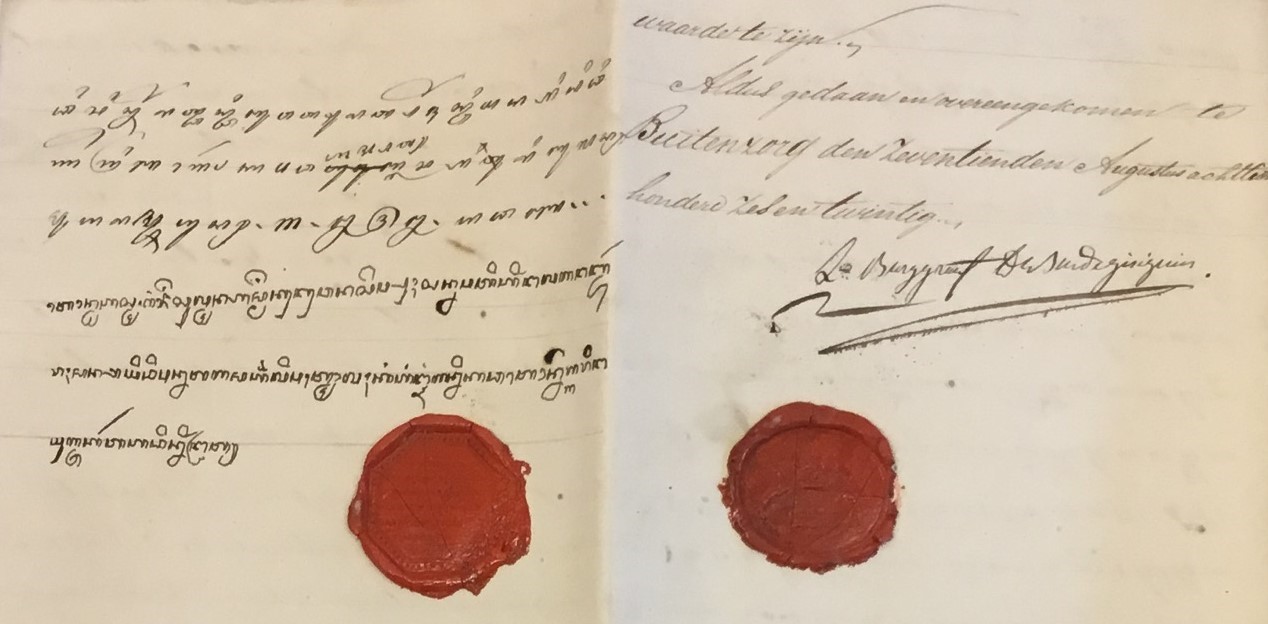Image: Signatures and seals of a treaty between Sultan Hamengkubuwono II of Yogyakarta and the Governor of the Dutch East Indies (Indonesia), Leonard du Bus de Gisignies, 17 August 1827. The left column is written in Javanese and the right in Dutch (Nationaal Archief, The Hague).
About the research
Historical Treaties of Southeast Asia is a collaborative research program in global and diplomatic history that investigates the often overlooked role of international treaties in imperial expansion. By systematically analysing all of the around one thousand bilateral treaties concluded between, on the one hand, a European, American or Japanese imperial power and, on the other hand, a Southeast Asian state or sovereign from the middle of the eighteenth to the early twentieth century, the project aims to develop new ways of understanding the causes and effects of colonialism in Southeast Asia and beyond.
The program started in 2022 and runs for six years, until the end of 2027. The core research team consists of seven historians from Europe and Southeast Asia, in addition to two research assistants. The program's research consists of three major phases:
First, the researchers in the program localise and copy or consult all the original treaty documents that have survived in national archives and other document collections in Asia, Europe and the Americas. An important aim of the project is to locate the Asian versions of the treaties, in contrast to most existing published and digital collections of international treaties, which generally only render the European versions of the treaties. The researchers then study the contents and character of the original treaty documents, analyzing the different translations and versions at hand as well as the inter-cultural, literal and symbolic, meanings of the treaties. The first part of the program's research is scheduled to run from 2022 until the middle of 2024. During this time, a database of treaties, including transcriptions and metadata of all available versions of the original treaties, will be set up and published at the project's website.
The second part of the program's research consists of an in-depth study of between twelve and fifteen treaty-making processes, each of which involve a sequence of treaties and treaty negotiations between two or more parties over many years or decades. By looking at first-hand archival sources, such as instructions, reports, correspondence, transcripts of meetings and images pertaining to the treaty-making activities, the research aims to unravel the motivations, interests and agency of the different Asian, European and American actors involved. This part of the research is scheduled to start in 2024 and conclude in 2026.
In the third and last phase of the program (2026-27), the empirical data and analyses from the previous two stages will be used to develop and test new theories and concepts pertaining to colonialism and imperialism in Southeast Asia. The findings of the program's research will be confronted with research on other regions of the world in order to assess to what extent the results are valid beyond Southeast Asia. In doing so, the project aims to contribute to a more nuanced and more balanced understanding of the complex process of modern imperialism which takes into account the agency of Asian as well as European and American actors.
All available versions of the treaties will be published in a searchable and open online database along with the results of the program’s research. In these and other ways, the project will contribute to spread knowledge about some of the most fundamental source documents in the making of modern Southeast Asia, whose influence continues to reverberate throughout the region and the world today.
The program is financed by a research environment grant (project-id 2020-03796_VR) from the Swedish Research Council. It is hosted by Linnaeus University, and most of the members of the research team are also members of the Linnaeus University Centre for Concurrences in Colonial and Postcolonial Studies, a leading Scandinavian research hub for colonial and global history and postcolonial studies.
For more information about the program, listen to this podcast from the New Diplomatic History Network, or watch this short film:




